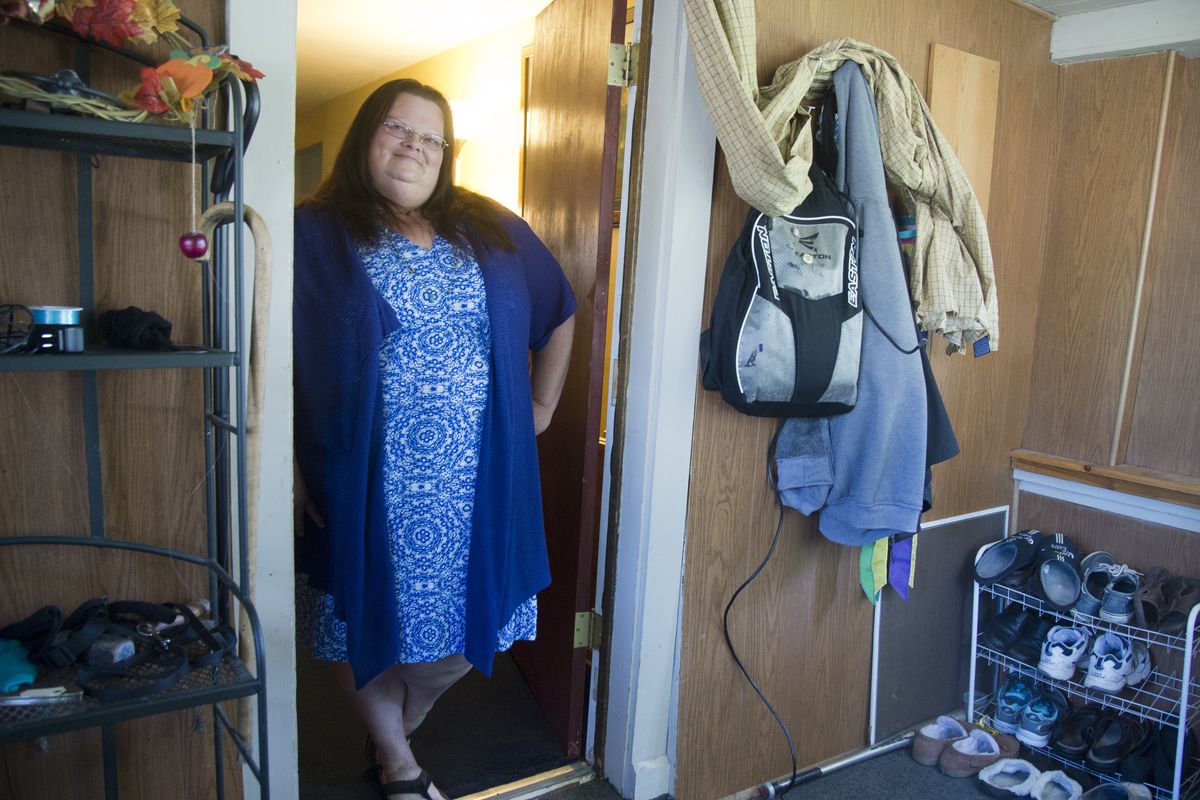Cigarettes unwelcome after ‘rebirth’
Quitting smoking first of woman’s many steps on healthier path
Pattie Kappen, photographed in her home June 12, finally quit smoking last year, kicking a nearly 20-year habit. She has dropped nearly 40 pounds in preparation for gastric bypass surgery. To celebrate her accomplishments so far, she bought her first dress. (Jesse Tinsley)Buy a print of this photo
Pattie Kappen was 17 when she smoked her first cigarette. She was trying to catch the attention of a cute, dark-haired boy at Havermale Alternative High School, who hung out in the smoking area.
As a pickup move, smoking was a huge success: The boy became Kappen’s husband. But that initial cigarette escalated into a two-pack-a-day habit.
“The first thing I wanted when I woke up in the morning was a cigarette,” Kappen said. “I’d smoke one right after another. I wanted to live a healthier life, but cigarettes were in the way.”
Kappen credits the staff at CHAS Health, Spokane’s community health clinics, for helping her kick a 17-year habit. Last August, she smoked her last cigarette and embarked on a series of positive life changes.
The 35-year-old diabetic has lost 38 pounds through exercise and healthier eating habits. Her blood pressure and her blood sugar levels have dropped, and her asthma bothers her less.
“She’s an inspiration,” said Kathryn Moore, a physician’s assistant and Kappen’s primary care provider. “Quitting smoking is a huge deal. She’s on a path to good health.”
Producing more success stories like Kappen’s is a priority at CHAS Health, whose clinics serve predominantly low-income families. About 63 percent of the clients age 12 and older smoke, compared to about 19 percent of adults in Spokane County.
“Smoking affects people of lower socio-economic status more. It affects people who have less formal education more. It affects minorities more,” said Dr. Bill Lockwood, chief clinical officer at CHAS.
Last year, the staff ramped up efforts to help people quit smoking. They figured it was the single most important thing they could do to help clients be healthier.
Smokers are asked if they’re interested in quitting. Besides prescribing medications to address nicotine withdrawal, the staff makes sure clients have follow-up resources to help them break routines like having a cigarette after breakfast or smoking in the car.
“The behavioral addiction is as hard for most people to break as the physiological addiction,” Lockwood said. “You have to have a system that supports the client all the way through.”
Nicotine stimulates pleasure centers in the brain and has a calming effect. Milligram to milligram, it’s more addictive than heroin.
“People have a pleasant association with thousands and thousands of episodes of smoking,” Lockwood said. “They do it at specific times of the day. It becomes part of their routine.”
Ready to quit
When Kappen walked into Moore’s office last year, she was ready to quit smoking. She carried more than 400 pounds on a petite frame.
The morbid obesity was the result of being molested as a child and years of emotional abuse, Kappen said. Food was her coping mechanism.
Kappen had started seeing a therapist to deal with the childhood trauma, and she wanted gastric bypass surgery to get to a healthier weight. But her health insurance provider wanted assurance that Kappen could make the lifestyle changes necessary to live with decreased stomach capacity and a restricted diet. To demonstrate that, Kappen had to lose 5 percent of her body weight.
“In order to lose weight, I had to exercise,” she said. “But I couldn’t even walk through Wal-Mart without hacking.”
Smoking was a barrier to the changes she wanted to make. Though her past efforts to quit had failed, Kappen was determined to make it happen.
“She was highly motivated,” said Moore, the physician’s assistant. “And she had the support of her husband, who quit at the same time.”
Ross Kappen, 36, wanted to see his wife succeed. She’d always teased him that she started smoking because of him. When she said, “Honey, I’m sorry, but you’re going to have to quit smoking, too,” he immediately agreed.
“It sounded great to me,” Ross Kappen said. “We needed to quit. It was way past time.”
Among other things, the couple worried about the example they were setting for their 16-year-old son. They didn’t smoke in the house, but the odor hung on their clothes.
Moore prescribed Chantix, one of the newer smoking cessation drugs, for the couple. Some people can’t take it because of the side effects, which can include psychiatric problems. But smokers who are able to tolerate the drug tend to do well on it, Lockwood said.
“It takes away the screaming need for nicotine,” Moore said.
Chantix mimics some of nicotine’s effects by stimulating some of the same receptors in cells. It also blocks nicotine “from glomming on to those receptors,” Lockwood said.
Three days after she started on Chantix, Pattie Kappen smoked her last cigarette. “I thought it would be hard, but the cravings just stopped,” she said.
“I was skeptical, because we’d tried to quit so many times before,” Ross Kappen said.
But he had a similar experience. About 10 days after he started the prescription, he tried to smoke.
“That cigarette was the most horrible thing I’ve ever tasted,” he said.
For months afterward, the couple kept a carton of cigarettes in the freezer. It reassured them to know they had cigarettes on hand if either of them lapsed. Pattie Kappen eventually gave the carton to a homeless man.
“I know you really want these,” she told him, “but you should try to quit smoking.”
‘This is so life-changing’
With smoking behind her, Pattie Kappen turned her focus to diet and exercise.
A dietitian helped her overhaul her eating habits. Ross Kappen is a manager at Zip’s Drive-In, so it was easy for him to bring home fast food on nights Pattie didn’t feel like cooking dinner.
With the dietitian’s help, she started planning meals with whole grains, lean meats and fruits and vegetables.
Kappen’s exercise routine began on a treadmill, with 15 minutes of walking daily. She eventually switched to walks in her South Hill neighborhood, gradually adding distance. Ross joined her. They walked a mile each day, then two.
“I can take deep breaths without it hurting,” Pattie Kappen said.
Her perpetual smoker’s cough disappeared. Simple chores, like walking up and down the stairs to do laundry, got easier.
By giving up smoking, she also gained about three hours in her day.
Over six months, Kappen lost about 10 percent of her body weight, dropping from 418 pounds to 380. She was able to reduce the amount of medication she takes for high blood pressure and diabetes.
Her insurance company gave her the green light for a gastric bypass. Kappen has been working with a Seattle doctor to prepare for the surgery, which is yet to be scheduled. After the surgery, her goal is to lose about 200 pounds.
During a doctor’s appointment, she was able to fit into a machine for a scan. At her previous weight, she would have been too large.
“This is so life-changing,” Kappen said. She recently went out and bought a sky-blue dress to celebrate. It’s the first dress she recalls wearing.
She frequently tells her story to people she meets. She wants to encourage others who are struggling to quit smoking, to lose weight or to deal with past abuse.
When Kappen achieves her weight goal, she plans to legally change her name.
“It’s kind of like a rebirth,” her husband said. “That old Pattie isn’t there anymore. It’s what she feels she needs to do to make this transformation complete. And, I’ll love her no matter what her name is.”
Kappen hasn’t settled on her new identity yet.
“I’ve told him, ‘I don’t know who she’ll be, but you’ll like her,’ ” she said.

